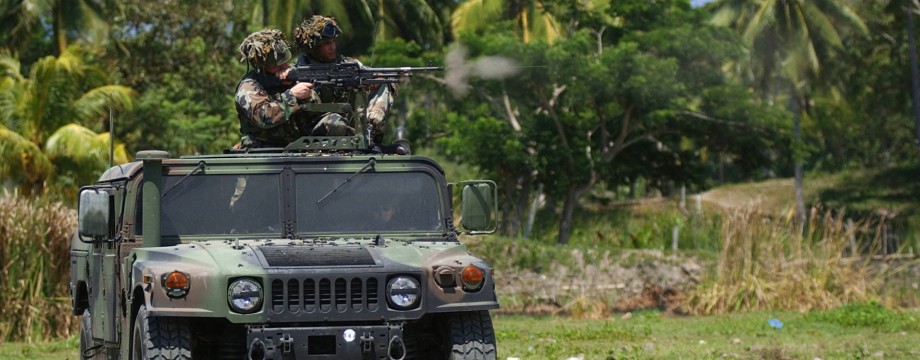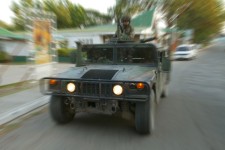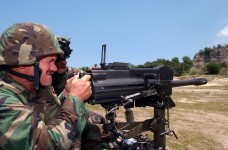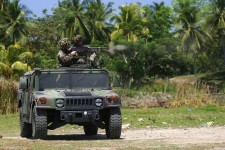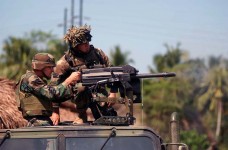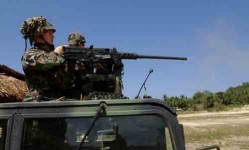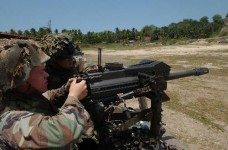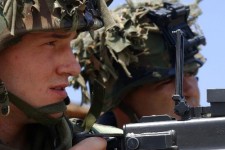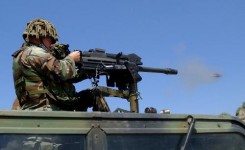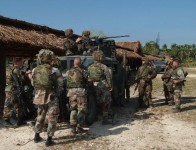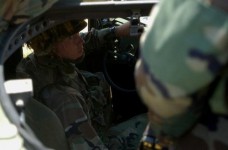Contents
Introduction
In January 2003, a composite unit from both 3rd Battalion 3rd Marines deployed to the Philippines as a Marine Security Element to guard Camp Navarro and Edwin Andrews Air Base in Zamboanga City, Philippines. They returned in May 2003. This would be 3rd Battalion 3rd Marines’ only deployment to Operation Enduring Freedom-Philippines (OEF-P).
Timeline
22 January – “Kilo Company OEF-P personnel depart for the Philippines.”
12 February – “Kilo Company OEF-P personnel augments depart.”
16 May – “CAAT Light personnel return from 120-day deployment to Philippines in support of OEF-P.”
— Source: 3/3 Command Chronology for the Period 01 January to 30 June 2003
News
Marines working in Philippines always on guard
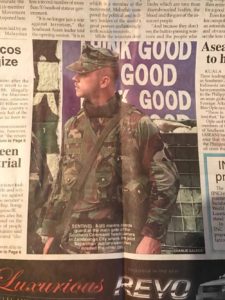
Lance Cpl. Jonathan Tackett, Kilo Company. Zamboanga City, Philippines. February 2003. Copyright © The Philippine Star 2003
By Juliana Gittler
Stars and Stripes
Published: May 20, 2003
Edwin Andrews Air Base
In January 2003, a composite unit from both 3rd Battalion 3rd Marines deployed to the Philippines as a Marine Security Element to guard Camp Navarro and Edwin Andrews Air Base in Zamboanga City, Philippines. They returned in May 2003.
The Marine Security Element mission is to “deter, detect and mitigate any terrorist attempt against U.S. personnel,” said MSE commander Marine Capt. Mark Clingan. The biggest part of that mission, he said, is deterrence.
Marines must guard local bases where U.S. personnel live, convoys going to humanitarian projects and the air base’s flight line, the entry and exit point for U.S. supplies and people.
Security is fierce around any activity outside the walled perimeter of the installations where U.S. forces stay. Medical teams, for instance, travel in convoys with armed Humvees.
“Wherever we go, we carry a lot of firepower,” Clingan said. “The threat is real. There’s enough threat out there to carry live weapons and be on high alert.”
That security stance extends on base. All servicemembers carry side arms, but the Marines are on constant watch. When not on patrol, they practice reacting to emergencies. The goal: Be prepared for any contingency.
“The Marines don’t get much time to themselves,” Clingan said.
They’re even under orders to forego the two beers a week other servicemembers are allowed.
“It a real-world mission,” said platoon commander 2nd Lt. Garland Gill Jr., who made the decision to ban the beer. “Every time you go outside the gate, you don’t know what’s going to happen.”
But reminders of what could happen have become part of the context of the servicemembers’ daily lives: In October, Army Sgt. First Class Mark Jackson, a decorated Green Beret, died when a terrorist bomb exploded at the restaurant where he sat with members of the Philippine armed forces. Two weeks ago, a Philippine police officer died after a shootout with terrorists outside the air base where Americans stay. That same base came under mortar attack 18 months ago.
To be prepared, Marines must constantly be ready. They’ve learned to go from their bunks to formation in a minute during drills, Clingan said.
“They never really get a break,” he said, “just to make sure we don’t get complacent.”
The company is from the 3rd Battalion, 3rd Marine Regiment in Kaneohe Bay, Hawaii — and many of its members say they wouldn’t mind staying in the Philippines beyond their several-month rotation. In Zamboanga, the Marines explain, they’re doing, not just training.
They may not have much time out of body armor and helmets, but there are, they say, a few perks.
One is knowing they’re appreciated. Some locals, Gill said, give the Marines tips about terrorists in the area: “They look out for us because they want us to be here.”
And, some Marines say, they already know their time in Zamboanga will stand out when they look back over their careers someday.
“It humbles you a lot. As an American you take a lot of things for granted,” said Cpl. Meikos Ellis. “It’s really amazing to actually get to devote your time to something good.”
Copyright © Stars and Stripes 2003
Photographs
- Ruben Reyes, Ernesto Gonzalez, Jorge Valdounial
- Ryan King
- Ryan King
- Bryan Webber
- Michael Robbins
- Justin Hampton
- Matthew Bakken
- Bryan Webber
- Jason Coffelt
- Richard Farwell
